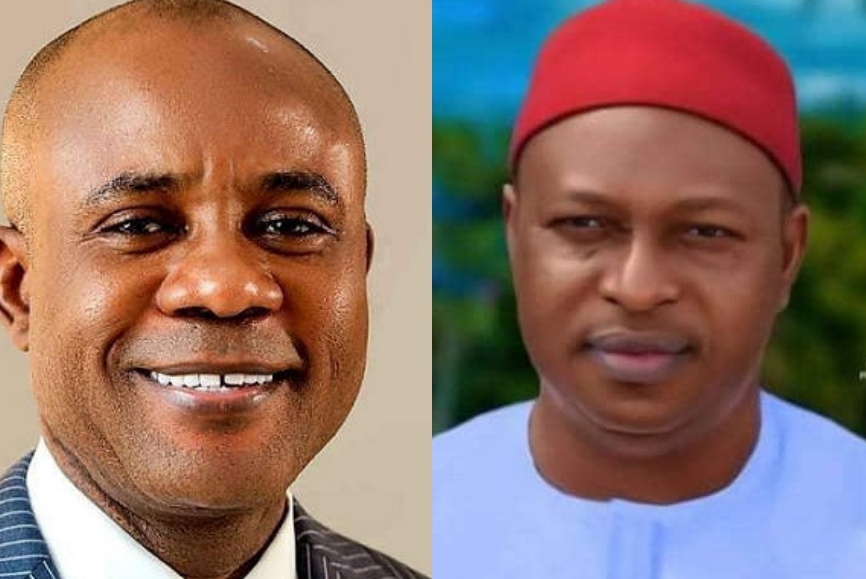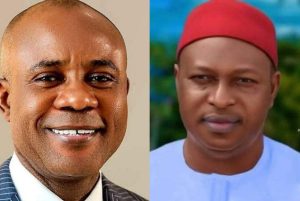Enugu State Tribunal: Chijioke Edeoga vs Peter Mbah
6 min read
Peter Mbah and Ifeanyi Edeoga
By Emeka Ugwuonye
The proceedings at the tribunal are moving at a steady and encouraging pace. The tribunal has had intense activities in the past three days. On Thursday, the tribunal ordered Peter Mbah to appear before it on Friday (yesterday) to defend the NYSC Certificate he has been using. Yesterday, at the proceeding, Peter Mbah failed to honor the order of the court. His lawyers advised him not to show up because he would face a greater trouble if he showed up. It is rare for a lawyer to advise his client to disobey a court order. It is extremely rare. That could only happen if the lawyer believes that his client would be convicted. Even at that, a lawyer has no option but to advise his client to obey the court regardless of consequences. This is because nobody actually gets far by disobeying court orders. So, one must be wondering, what consequences would Peter Mbah face by obeying court order that could be more grave than disobeying the court? That suggests how extremely grave the fate of Mbah must be. But how long can he afford to avoid the court? By avoiding the court or disobeying the orders of the court, it is a sure sign that he believes he will lose the case.
The allegations of forged certificates can now be seen by everybody as the biggest threat to Mbah. He is trying to avoid facing that question. But there is no progress for him without him clearing the air on that. That issue has now become the gateway he must pass through in order to hold onto the office as Governor of Enugu State. He is fighting in a number of directions to deflect the question. In addition to failing to appear in court, he sent a lawyer to try to enforce the order of Justice Inyang Edem Ekwo who had earlier issued an order of injunction restraining NYSC from disclosing any information on Mbah’s NYSC record. That was a highly controversial and unprecedented order by a court. Also, it was just an ex parte order, which by its very nature is limited in duration and susceptible to being vacated upon a merit hearing. All these efforts by Mbah are too little and too late to alter the inevitable direction of this case.
The court sat today (Saturday). Today, the court ruled on the application seeking to compel Mbah to furnish the court with the following:
(1) the date he was discharged from NYSC,
(2) the year he sat for the WAEC examination,
(3) the year he was appointed as chief of staff to the Enugu state government.
The clear purpose of these questions is to show three things: (a) that Mbah did not perform his national service under the NYSC scheme, (b) that Mbah also forged his WAEC results, and (c) that the NYSC discharge certificate he presented was a forgery. It is a brilliant tactic. It seeks to show two things – that the certificates are fake and that he is not entitled to any certificate because he has not done his service. That makes it impossible for someone to say: “Well, let him be issued with the right certificate if the one he showed turned out to be fake”. As regards his WAEC, he sat for WAEC but did not like his scores. So, he forged a WAEC result. In that case, he can be issued the right result that he had. But as regards NYSC, he didn’t do it at all. The fact that he is not entitled to any certificate means that there is no possibility of NYSC being asked to issue him the right certificate since the one he has is not the right certificate.
Mbah has failed to comply with these subpoena requests for documents. The court was to deal with it today. It was either for the court to delay the proceedings and give Mbah more time to try to comply or for the court to move on despite his noncompliance. If the court tried to wait for Mbah, that would be falling into Mbah’s game plan. His game plan is to delay these proceedings for as long as possible. It is like postponing the date of the judgment you fear will be against you. The longer it takes for the judgment to come out, the longer Mbah will be occupying the office of the governor. He wants to prolong it as long as possible. Mbah wants to hold the tribunal to ransom. The judges seem to understand that, and they have resisted it. Instead of postponing the proceedings, the court ruled that these same requests could be raised as questions during the cross-examination of Mbah. At some point, Mbah will be forced to enter the witness box to defend his claims. Then, these same questions will be presented to him directly.
Any experienced lawyer can easily imagine the line of questioning that will be meant to cover the same questions that Mbah fails to answer now in the form of interrogatories. In addition to asking him the date he completed his NYSC, the cross-examination questions will extend to questions such as:
(1) On the so and so date, you received a subpoena requesting you to furnish this court with your certificate, but you failed to do so: Why did you fail to do so? This question is tougher than a mere request for you to produce the certificate. This question suggests that you deliberately ignored the subpoena, and it raises questions such as whether any certificate you may show at a later date is genuine.
(2) What did you do after you received the subpoena? Are you prepared to tender today those documents requested of you? If you claim you don’t have those documents, who has them, what effort did you make to retrieve them from the person (say his grandmother) that you gave them to for safekeeping?
The cross-examination moment will be very intense for Mbah. The judges will be watching his demeanor as he tries to maneuver himself out of these questions. It will be a baptism of fire. By avoiding tendering these documents now, Mbah has opened himself up to a different layer of questions regarding his attitude toward the tribunal and he is now open to certain presumptions in law of evidence such as the presumption that if a party in possession of document fails to tender such document on request, it is to be taken that the contents of the document are against his position. So, the court can safely presume that the only reason Mbah failed to produce the documents requested of him is that such documents do not exist or that the contents of the documents are against him. At this point, Mbah has placed himself where such presumptions will be valid if made by the court. I believe that the lawyers for Edeoga will urge the court to make such presumptions.
Before rising from today’s sitting, the tribunal issued a scheduling order, setting forth the following timeline for various events toward the conclusion of the case:
(1) Labor Party and Hon. Edeoga have 7 days to present their case.
(2) PDP and Mr. Peter Mbah have 4 days thereafter to present their defense, and
(3) INEC has 2 days to present its defense .
Based on this scheduling order, the tribunal will render judgment by the end of July of 2023. Even though these dates could change, i.e., the scheduling order can be modified by the court, any delay will not go beyond the middle of August. Then, the appeal to the Supreme Court will follow. I am now estimating that the whole case, including appeals, will be over by the end of October or early November, instead of the December that I had previously predicted.







